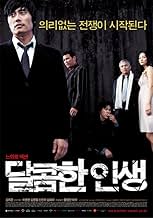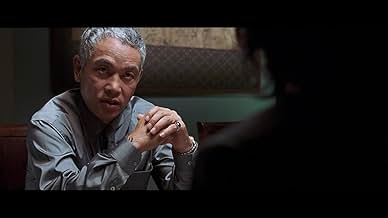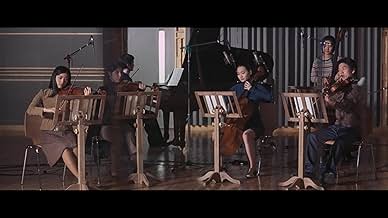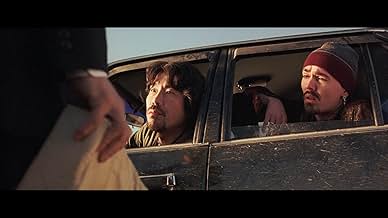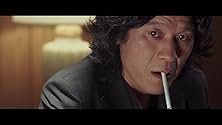Als er sich nicht an die Anweisungen seines Chefs hält, bekommt ein Top-Gangster Problem.Als er sich nicht an die Anweisungen seines Chefs hält, bekommt ein Top-Gangster Problem.Als er sich nicht an die Anweisungen seines Chefs hält, bekommt ein Top-Gangster Problem.
- Auszeichnungen
- 8 Gewinne & 14 Nominierungen insgesamt
Kim Yeong-cheol
- Mr. Kang
- (as Kim Young-chul)
Kim Hae-gon
- Weapon smuggler
- (as Hae-gon Kim)
Eric Moon
- Gun Dealer's Brother
- (as Eric)
Empfohlene Bewertungen
I could sit here and start this review off any number of ways to make this film sound ultra important. I could say, once in a great while a film comes along, blah, blah. Or, Only a select few films ever have reached this, blah, blah. Or I could say, if you see one movie this year, blah, blah. You know the drill. These are the opening sentences the big-boy critics use when they really want you to see a flick and when they want a particular review to really stand out. Well, films that deserve this kind of "special" praise really do only come around once in a great while. Unbelievably, I have seen two in only six months time. The first was what I like to call the first real 21st Century film, and that was Oldboy. And the second film of this status also comes from Korea, believe it or not, and it is Bittersweet Life.
Bittersweet Life is probably one of the most simple, most streamlined modern films I have ever seen. It is lean, mean, and like its lead male, a damn ruthless fighting machine. The film beats along with its Raymond Chandler-like screenplay with all the jazz and style of early 90's John Woo and with the energy and themes of Quentin Tarantino's grind house 70's. Life plays with your emotions, making you care for the bad-guy hero even though he is a vicious killer, and causes one to release tension through laughter when the blood starts gushing like a dozen ruptured fire hoses. Wholesale death, blood by the gallons, broken bones and multiple beatings with humongous pipe-wrenches, two-by-fours, and lead pipes are on order, right after a heaping dish of innocent love and a guy trying for once to do the right thing.
The plot, well you see, it's like this: you can see everything coming a mile away, the movie plays it straight, and follows the exact path you know it will and the exact path you hope it will. There are no twist endings, no complicated triple crosses, no hidden motives for the characters. Everything on screen happens the way you see it, and everything thing ends exactly the way you picture it. And this is a good thing. The film is so on track that it doesn't need a twist or a swerve to make you pay attention. It starts at A, ends at E, and hits B, C and D on the way there. Life is so steeped in its genre tropes of noir character and themes that the ending is know to all of us before it even starts. However, it's the journey that matters, and I'll be damned if you can find a better-looking, more brutally violent journey anywhere.
As much as I try to analyze the film, nothing comes to mind. And this is the purest of all compliments. The film is as shallow as the pools of blood splattered in the hallways, alleyways and run down exteriors of the sets. Often times a director feels the need to bog a simple story down with twists, and a deeper meaning to hide the fact that they are afraid to just let things happen because they need to happen. Bittersweet Life is not one of these films. It exists with its soul laid bare for all to see, and when the carnage is complete, you thank the film for being honest with itself. As the final credits roll you might find yourself asking, "Is that it?" Yes, that is itcinematic perfection. It is all it needs to be: pure and simple, boisterous and calm, bloody and drenched in gore and an honest movie with nothing to hide.
--genrebusters
Bittersweet Life is probably one of the most simple, most streamlined modern films I have ever seen. It is lean, mean, and like its lead male, a damn ruthless fighting machine. The film beats along with its Raymond Chandler-like screenplay with all the jazz and style of early 90's John Woo and with the energy and themes of Quentin Tarantino's grind house 70's. Life plays with your emotions, making you care for the bad-guy hero even though he is a vicious killer, and causes one to release tension through laughter when the blood starts gushing like a dozen ruptured fire hoses. Wholesale death, blood by the gallons, broken bones and multiple beatings with humongous pipe-wrenches, two-by-fours, and lead pipes are on order, right after a heaping dish of innocent love and a guy trying for once to do the right thing.
The plot, well you see, it's like this: you can see everything coming a mile away, the movie plays it straight, and follows the exact path you know it will and the exact path you hope it will. There are no twist endings, no complicated triple crosses, no hidden motives for the characters. Everything on screen happens the way you see it, and everything thing ends exactly the way you picture it. And this is a good thing. The film is so on track that it doesn't need a twist or a swerve to make you pay attention. It starts at A, ends at E, and hits B, C and D on the way there. Life is so steeped in its genre tropes of noir character and themes that the ending is know to all of us before it even starts. However, it's the journey that matters, and I'll be damned if you can find a better-looking, more brutally violent journey anywhere.
As much as I try to analyze the film, nothing comes to mind. And this is the purest of all compliments. The film is as shallow as the pools of blood splattered in the hallways, alleyways and run down exteriors of the sets. Often times a director feels the need to bog a simple story down with twists, and a deeper meaning to hide the fact that they are afraid to just let things happen because they need to happen. Bittersweet Life is not one of these films. It exists with its soul laid bare for all to see, and when the carnage is complete, you thank the film for being honest with itself. As the final credits roll you might find yourself asking, "Is that it?" Yes, that is itcinematic perfection. It is all it needs to be: pure and simple, boisterous and calm, bloody and drenched in gore and an honest movie with nothing to hide.
--genrebusters
I had the luck to watch this gem at the Fantasy-Film-Festival in Frankfurt yesterday. It was shown in a theater with about 600 seats and against my expectations the room was packed with people.
In comparison with Oldboy or Sympathy for Mr. Vengeance the story is not as deep and goes more straightforward to the pure revenge theme. But this does not make the movie less enjoyable. The cinematography is brilliant and the main-character delivers a great performance. It contains beautifully choreographed martial-arts and gunfight scenes with references to masterpieces like Taxi Driver and Kill Bill.
Despite the fact it is very harsh in some scenes the humor does not come to short. The scene with a discussion of Korean-Russian wannabe-gangsters made me nearly wet my pants.
In comparison with Oldboy or Sympathy for Mr. Vengeance the story is not as deep and goes more straightforward to the pure revenge theme. But this does not make the movie less enjoyable. The cinematography is brilliant and the main-character delivers a great performance. It contains beautifully choreographed martial-arts and gunfight scenes with references to masterpieces like Taxi Driver and Kill Bill.
Despite the fact it is very harsh in some scenes the humor does not come to short. The scene with a discussion of Korean-Russian wannabe-gangsters made me nearly wet my pants.
This is my first review on here, only because I felt compelled to tell someone about this film
When I say "coolest," I don't mean it in a that-movie-was-really-cool kind of way
Coolest, in this case, means that it is the smoothest, well-crafted, stylish, and beautiful films I have ever seen. Everything about the film has a you'll-never-be-this-cool feel, like Jules and Vincent from Pulp Fiction. Not to mention the fact that it has the same sort of humor.
Now, I am a film student who has actually gotten a lot of praise from students and teachers and whatnot for my first film project That's great and all, but after seeing this film I am reminded of what Steven Spielberg said after he saw The Godfather; "I guess I should quit now, because I will never make something this good." I am, in no way, comparing myself to Spielberg, I'm just describing the feeling of, "holy s***, this is amazing," and "wow, I could never do this ever "
See this movie before you die Or before it gets remade.
Now, I am a film student who has actually gotten a lot of praise from students and teachers and whatnot for my first film project That's great and all, but after seeing this film I am reminded of what Steven Spielberg said after he saw The Godfather; "I guess I should quit now, because I will never make something this good." I am, in no way, comparing myself to Spielberg, I'm just describing the feeling of, "holy s***, this is amazing," and "wow, I could never do this ever "
See this movie before you die Or before it gets remade.
I can see how this movie is well liked by many people. It's definitely different from a Hollywood movie, and a breath of fresh air from "the formula". At the same time, it's not so different as to cause discomfort or incomprehension. Violence is violence everywhere.
If you compare this movie against other great Asian action movie directors, than I think it's not that special. It's well done, but it's ultimately a light movie. A bit like an Asian version of an Hollywood action movie. There are some moments though (the end comes to mind), where the movie does show some signs of self awareness. But overall, it's a fairly straightforward, over the top gangster movie. If that's what you're looking for, you'll be pleased, but don't expect to be blown away by a masterpiece of cinema.
If you compare this movie against other great Asian action movie directors, than I think it's not that special. It's well done, but it's ultimately a light movie. A bit like an Asian version of an Hollywood action movie. There are some moments though (the end comes to mind), where the movie does show some signs of self awareness. But overall, it's a fairly straightforward, over the top gangster movie. If that's what you're looking for, you'll be pleased, but don't expect to be blown away by a masterpiece of cinema.
After Tale of Two Sisters, Ji-woon Kim's new movie has been eagerly anticipated. In his previous film, the marks of originality, intellectual challenge and superb visual style hailed the possibility of a brave new voice in Korean cinema.
A Bittersweet Life commences with similarly awesome photography and ambiance. The wind in the leaves of a tree - Is it the leaves or the wind that moves? asks the disciple of the master. Neither, he replies, it is your mind and heart that moves. Cut to La Dolce Vita, the swish bar restaurant which we are to discover is also the gangland stronghold of Sun-Woo. A single tree in the centre of the restaurant's sky lounge. The colours red and black, glossy and visually forceful in the lounge - they not only play heavily in the film but make any small deviations stand out. Lushness or delicacy is easily conveyed later in the film by colour, a respite to the bloodshed that will almost swamp us. A tinkling piano (Chopin is used as part of the score) adds a delicate counterpoint to what we know will surely be an overload of violence and mayhem.
Sun-Woo has served his boss, President Kang, faithfully for seven years and is now manager of Dolce Vita as well as Kang's right hand man. Background profits, and gang competition, focuses on innocuous little sidelines like the supply of guns or dancing girls, and which countries these should come from. Kang has a secret lover from the 'normal' world, a cellist who is much younger than he, and whom he suspects of infidelity. Kang entrusts Sun-Woo to sort it out and show no mercy. The warfare that follows goes beyond honour, beyond profit, beyond vengeance, . . . beyond any rational point in fact.
Sun-Woo is the ultimate cool bad guy. Indentured to a world of violence and expert in the use of martial arts, knives and guns, he is almost a humanised Bruce Lee who's woken up on a Tarantino set. It sounds almost too good to be true and it is. The story lines are formulaic and derivative, consisting largely of how to engineer more ingenious punch-ups, torture or revenge posturing. Light humour afforded in the contrast between suave topdogs and bumbling henchmen has been done so many times, and many of the entertaining debacles could have been borrowed from Kill Bill. But entertaining it is, on an undemanding level. Sadly it is not the work of the Master that we might have expected from Two Sisters. "The dream I had can't come true," laments the protagonist, and ironically the dreams Ji-woon Kim's fans may justifiably had don't quite come true in A Bittersweet Life, but this otherwise elegant shoot-em-up is still reasonable 'boys night out' night fare.
A Bittersweet Life commences with similarly awesome photography and ambiance. The wind in the leaves of a tree - Is it the leaves or the wind that moves? asks the disciple of the master. Neither, he replies, it is your mind and heart that moves. Cut to La Dolce Vita, the swish bar restaurant which we are to discover is also the gangland stronghold of Sun-Woo. A single tree in the centre of the restaurant's sky lounge. The colours red and black, glossy and visually forceful in the lounge - they not only play heavily in the film but make any small deviations stand out. Lushness or delicacy is easily conveyed later in the film by colour, a respite to the bloodshed that will almost swamp us. A tinkling piano (Chopin is used as part of the score) adds a delicate counterpoint to what we know will surely be an overload of violence and mayhem.
Sun-Woo has served his boss, President Kang, faithfully for seven years and is now manager of Dolce Vita as well as Kang's right hand man. Background profits, and gang competition, focuses on innocuous little sidelines like the supply of guns or dancing girls, and which countries these should come from. Kang has a secret lover from the 'normal' world, a cellist who is much younger than he, and whom he suspects of infidelity. Kang entrusts Sun-Woo to sort it out and show no mercy. The warfare that follows goes beyond honour, beyond profit, beyond vengeance, . . . beyond any rational point in fact.
Sun-Woo is the ultimate cool bad guy. Indentured to a world of violence and expert in the use of martial arts, knives and guns, he is almost a humanised Bruce Lee who's woken up on a Tarantino set. It sounds almost too good to be true and it is. The story lines are formulaic and derivative, consisting largely of how to engineer more ingenious punch-ups, torture or revenge posturing. Light humour afforded in the contrast between suave topdogs and bumbling henchmen has been done so many times, and many of the entertaining debacles could have been borrowed from Kill Bill. But entertaining it is, on an undemanding level. Sadly it is not the work of the Master that we might have expected from Two Sisters. "The dream I had can't come true," laments the protagonist, and ironically the dreams Ji-woon Kim's fans may justifiably had don't quite come true in A Bittersweet Life, but this otherwise elegant shoot-em-up is still reasonable 'boys night out' night fare.
Wusstest du schon
- WissenswertesThe Korean title "Dalkomhan Insaeng" and the name of the bar "La Dolce Vita" translate to "The Sweet Life". As an ironic touch the International English title is called "A Bittersweet Life".
- PatzerToward the end of the film, when Kim Sun-woo is walking down the corridor searching for his former boss, a guard sitting and reading a newspaper gets up to stop him. Kim Sun-woo shoots him but his gun is not pointed at the guard. Rather, it is clearly pointed at the wall where fake blood appears after the shot like a paint gun.
- Zitate
Sun-woo: One late autumn night, the disciple awoke crying. So the master asked the disciple, "Did you have a nightmare?" "No." "Did you have a sad dream?" "No," said the disciple. "I had a sweet dream." "Then why are you crying so sadly?" The disciple wiped his tears away and quietly answered, "Because the dream I had can't come true."
- Crazy CreditsAt the end of the credits, the sign above the bar that says "La Dolce Vita" is seen exploding.
- Alternative VersionenTwo versions of the film exist, the original theatrical version and the director's cut. The director's cut's edits include slight cutting and re-arrangement of scenes, swapping music placement and some additional scenes that do not appear in the original version of the film.
- VerbindungenReferences Das süße Leben (1960)
Top-Auswahl
Melde dich zum Bewerten an und greife auf die Watchlist für personalisierte Empfehlungen zu.
Details
Box Office
- Weltweiter Bruttoertrag
- 10.080.808 $
- Laufzeit
- 1 Std. 59 Min.(119 min)
- Farbe
- Sound-Mix
- Seitenverhältnis
- 2.35 : 1
Zu dieser Seite beitragen
Bearbeitung vorschlagen oder fehlenden Inhalt hinzufügen

